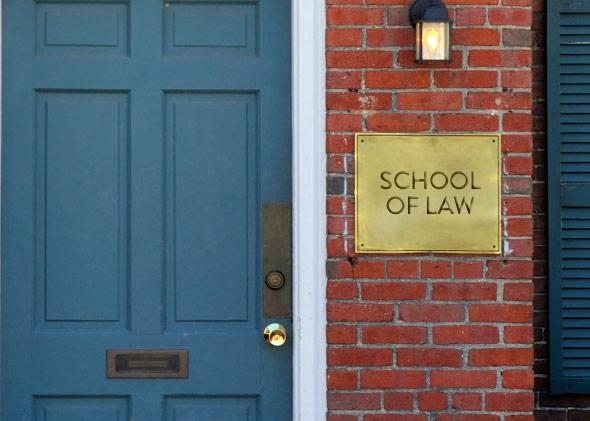In the world of law schools, every day is sort of like Black Friday.
OK, slight exaggeration. But with applications in free fall, schools are locked in a brutal competition to attract students who might theoretically one day be qualified to sit for a bar exam. And that, the New York Times reports today, has meant slashing tuition and dolling out discounts. At Northwestern University School of Law, one of the top ranked institutions in the country, “74 percent of first-year students this academic year received financial aid, compared with only 30 percent in 2009,” the paper notes. The University of Iowa, University of Arizona, and Penn State University have cut their prices. J.D.s are on sale!
That said, much like actual Black Friday merchandise, law degrees are being marked down from insanely high starting points. At Northwestern, the sticker price for tuition is about $56,000, to start.
But anyway, while I could choose this moment to revive my argument with Above the Law about whether it’s a good idea to go to law school (I’ve argued it is), there’s a different point I want to dwell on today. It seems fairly obvious that some law schools are going to have to close in the not too distant future. Between the fall of 2010 and fall of 2013, enrollments dropped 24 percent. This year’s crop of new students should be even smaller. And while schools are doing everything in their power to pare back expenses and prop up their head counts, it seems like someone is going to fall victim to a collapsing demand. “I don’t get how the math adds up for the number of schools and the number of students,” Northwestern Dean Daniel Rodriguez, told the Times. That’s because it probably won’t.
This has been a subject of fearful discussion in the legal academy for a while. Already, Western Michigan University Thomas M. Cooley School of Law, a notorious diploma mill, has been forced to close its Ann Arbor campus due to sagging enrollment. But, as University of St. Thomas School of Law professor Jerry Organ writes, the history of another graduate school bust suggests bottom-tier schools might not be the only ones affected. After peaking in 1979, dental-school enrollments precipitously collapsed (the reasons why included “improved dental health from fluoridation, reductions in federal funding, high tuition costs and debt loads,” among others, Organ explains). By the mid-1980s, they were down by about one-third. Then, over the next several years, six private universities closed their dental schools, including Emory University and Georgetown University, which had been the largest program in the country. Given there were only about 60 dental schools to begin with, this amounted to a pretty enormous bust. If about 10 percent of law schools closed, that would mean about 20 casualties. Could that possibly come to pass? I don’t know, but I wouldn’t entirely rule it out.
Universities decided to close their dental schools for a variety of reasons. Some were financial—Georgetown’s program was headed for a multimillion-dollar deficit. Some were academic: With fewer applicants, some institutions felt they couldn’t keep up standards. But the point is that law schools are facing similar pressures. Many institutions opened law schools precisely because they were supposed to be cash cows and won’t be particularly psyched to suddenly start subsidizing them. Meanwhile, qualified applicants are now harder to find for schools with some semblance of standards, because the biggest application declines have occurred among students who scored in the middle-to-high range on the LSAT. Or, as Organ writes, “For law schools, 2014 looks a lot like 1985 did for dental schools.”
* * *
Addendum: Obviously, the possibility that law schools will start shutting down complicates the calculation about whether or not it’s worth going (nobody wants to show up on campus only to see their school disappear). To be honest, I haven’t fully worked out how heavily to weigh the issue—and fully expect to get guff from the Above the Law crew in the near future.
